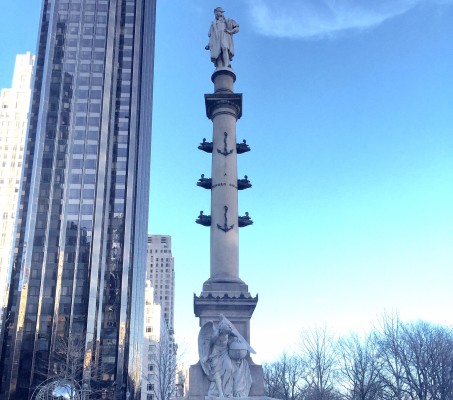Controversial Figures Deserve Dedications Too
Controversial Christopher Columbus has a statue in Columbus Circle. (PHOTO BY PAYTON VINCELETTE/THE OBSERVER)
April 15, 2015
There is a building in the campus of the University of North Carolina (UNC) that is called “Saunders Hall.” It is named after William Saunders, elected as North Carolina’s secretary of state in 1879, during which time he compiled the state’s colonial records into a 10-volume set. But students at UNC have vehemently called for the striking of his name from the hall, for while some may remember him fondly, others choose to remember him as a darker figure; a Confederate colonel and later organizer of the Ku-Klux-Klan. What can be learned from this? Can we honor someone for the good in his life while ignoring the bad, or do misdeeds cancel out good deeds?
We must recall that one of the most controversial figures in American history happens to have his name plastered on the circle that lies but one avenue over from Fordham Lincoln Center, and in addition to this, we celebrate a federal holiday each year in his honor. The renown of Christopher Columbus comes largely from his achievement of bringing the existence of the “New World” to the attention of the largest colonizing powers in Europe at the time. This act was integral in the creation of the America we know today, but what people often forget is that Columbus’s actions resulted in the forced relocations of the indigenous peoples living there at the time and in many cases, by way of unintentionally introducing harmful European-based diseases, caused their deaths as well.[quote_right]Moral perspectives change over time. [/quote_right]
However, this does not mean that we should stop remembering the deeds of Christopher Columbus, nor should we forget about the actions of other equally controversial figures in history. It is perfectly fine to acknowledge the good done by these figures, but it must be with an awareness that moral perspectives change over time. The lens of the present must be in constant dialogue with the lens of the past.
The University of North Carolina features another controversial dedication: a statue of a Confederate soldier known as “Silent Sam.” The soldier is named as such because, while he carries a rifle in his hands, he does not carry the ammunition to fire the rifle, thus rendering him “silent.” Granted, the Civil War was one of the darkest points in our nation’s history, but it does not behoove us to maintain the grudges between brothers that ignited the war in the first place. Still, many choose to see “Silent Sam” as a symbol of racial oppression, and it is for this reason that protesters chose this exact spot after the officers infamously accused of police brutality against Rodney King were acquitted in 2012.
But when placed in historical context, the Confederacy’s views towards African Americans would not have been perceived as “racist” or “wrong.” In fact, if we used the modern day definition of “racism” then we would have to admonish many of our own founding fathers such as George Washington and Thomas Jefferson. Again, this does not mean that we must blacken the names of these men.
In August of 2014, I took a road trip down south to Florida. It took about two days, so I needed to rent a hotel room in Richmond, Va. While I was there, I made it a point to visit the Museum of the Confederacy. There, I saw all kinds of artifacts from the war like uniforms, weapons, flags, clothing, rations and living accommodations, among others. I’m only the third generation of my family to live here in America, and none of my ancestors ever fought in the Civil War, so I had no genealogical reason to be at that museum. But I chose to visit because I understand that we put things in historical context for the express purpose of creating a learning experience. It is important to remember where we came from in order to know where we must go. It is not right to exclusively reserve hate for those that serve as our teachers.
So I would look at people like William Saunders and Christopher Columbus and describe them as such; they are men. Men whose triumphs are worth honoring, and men whose failings are worth learning from. In a way, we are them and they are us; above all, they are worth remembering.










